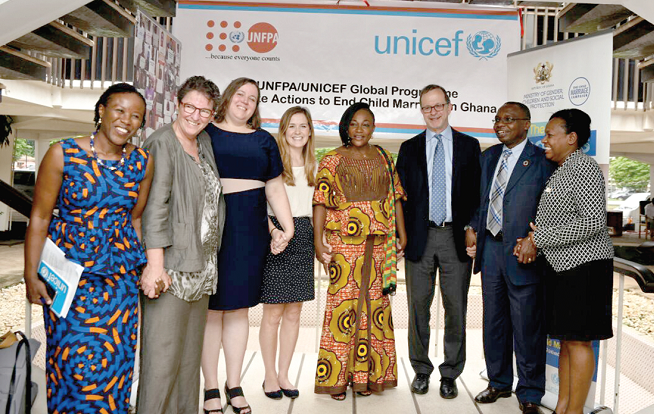
UNFPA-UNICEF intensify global programme to end child marriage
One of the most harmful traditional practices inflicted on girls in some parts of the world today is child marriage. Marrying off a girl before she is 18 can have a negative impact on her physical and mental health, her education and economic opportunities.
Advertisement
This has negative consequences not just on the girl but on her family, the community and the nation in which she lives.
Globally, more than 700 million girls and women alive today got married as children. This is a human rights violation on a vast scale and a major obstacle to sustainable development. If we are to achieve gender equality and empower all women and girls by 2030, more effort needs to be made to eliminate all harmful practices, such as child marriage.
While the practice of child marriage had been slowly declining, particularly for girls under age 15, more concerted efforts are still needed to accelerate the pace of change. If there is no reduction in child marriage, up to 280 million more girls alive today are at risk of becoming brides before they turn 18. The effects of population growth mean that this number will approach 320 million by 2050.
In response to dealing with the menace, the United Nations Population Fund (UNFPA), United Nations Children’s Fund (UNICEF) and donor partners launched a global initiative to eliminate child marriage to help protect millions of vulnerable girls from losing their childhood.
Global Programme
The Global Programme is working in 12 countries in South Asia (Bangladesh, India, Nepal), the Middle East & North Africa (Yemen); Eastern & Southern Africa (Ethiopia, Mozambique, Uganda, Zambia) and West & Central Africa (Burkina Faso, Ghana, Níger, Sierra Leone)
Ghana has a child marriage prevalence rate of 21 per cent. On average, one out of five girls will be married before their 18th birthday (Demographic Health Survey, 2014). The Northern Region has the highest level of child marriage with more than one girl in three who is married off during childhood. One of the key drivers for child marriage is teenage pregnancy.
Last week, the Minister of Gender, Children and Social Protection spoke at an African Union capacity-building workshop for journalists on ending child marriage. Ms Otiko Afisa Djaba condemned the practice and reminded the media, parents, community and traditional leaders among others, that this practice was wrong and needed to end.
Last year, the government of Ghana launched a national campaign to end the practice and the Ministry of Gender Children and Social Protection established an Ending Child Marriage Co-ordination Unit in 2014. This was followed by the launch of a documentary in the Upper East Region specifically, where all the traditional leaders under the President of the Upper East House of Chiefs pledged to work with the government to end the practice.
National Strategic Framework
A six-year National Strategic Framework to end child marriage (2017 - 2023), is also about to be launched, while an adolescent pregnancy strategy is also being developed by the ministry.
This week (5th – 9th March), the Steering Committee that comprises representatives from UNFPA, UNICEF, the Governments of Canada, Netherlands, the United Kingdom, as well as the European Union, has met with Ms Otiko Afisah Djaba.
This is the first time this body will meet in one of the 12 countries of the global programme. Members of the Steering Committee will visit UNFPA and UNICEF’s complementary programmes which deliver services for married and unmarried girls. Such programmes include those which address the social norms and behaviours that promote the practice, to prevent girls from getting married before they are 18, as well as health and education services.
As Ghana celebrates its 60th anniversary this month and International Women’s Day this week, it is the hope that Ghana can soon celebrate the achievement of Sustainable Development Goal 5.3 which seeks to eliminate all harmful practices, such as child marriage. This is a goal which is within our reach. We can work to make it a reality.




